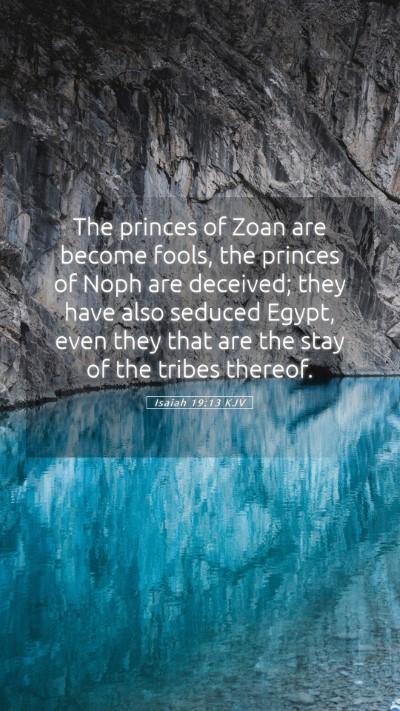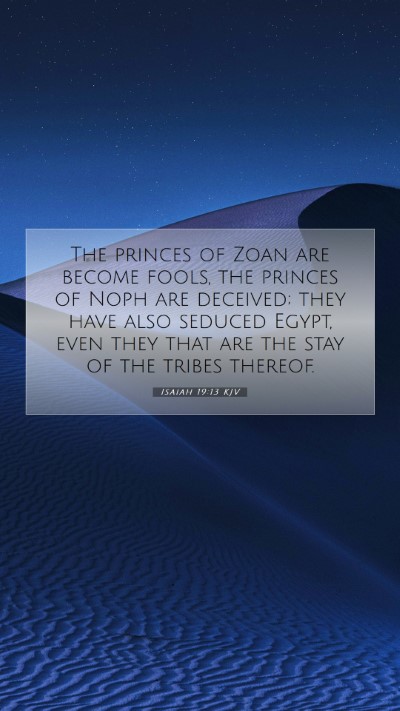Understanding Isaiah 19:13
Bible Verse: Isaiah 19:13
This verse states:
"The princes of Zoan are become fools, the princes of Noph are deceived; they have also seduced Egypt, even they that are the stay of the tribes thereof."
Bible Verse Meaning and Interpretation
The verse presents a prophetic declaration concerning the leaders of Egypt during a time of impending judgment. Here is an insightful analysis combining thoughts from various public domain commentaries:
General Observations
In this passage, Isaiah points out the foolishness and deceit of the Egyptian leaders—particularly those from Zoan (Tanis) and Noph (Memphis). Their misguided decisions not only led them astray but also adversely affected the stability of the entire nation.
- Matthew Henry: Henry emphasizes that the leaders have lost wisdom through their wickedness and that their corruption has trickled down to influence the people they govern. In essence, the rulers’ folly is mirrored in the nation’s fall from goodness.
- Albert Barnes: Barnes interprets the terms "fools" and "deceived" to highlight the moral and spiritual blindness of the leaders. They failed to adhere to divine guidance and consequently led their people into folly.
- Adam Clarke: Clarke notes that the failure of these leaders represents a deeper, systemic problem of trustworthiness in governance. The text suggests that without righteous leadership, the populace is left vulnerable and directionless.
Thematic Implications
Isaiah 19:13 serves as a cautionary tale regarding leadership and its profound effect on the moral compass of a nation:
- Folly of Leadership: The passage illustrates how ungodly leaders can create an environment ripe for disaster, highlighting the importance of wisdom and integrity in governance.
- Divine Judgment: The context of this verse is set within a larger narrative of impending judgment against Egypt. This serves to remind readers of the consequences of turning away from God.
- Social Deception: The leaders are deceived, indicating how societal influences can lead both leaders and followers away from truth, a reality echoed throughout scripture.
Application for Modern Readers
For those interested in Bible verse explanations and Bible study insights, it is crucial to draw lessons from the failures of Egypt's rulers. Scriptures like these can be applied to personal and communal ethics today:
- Personal Leadership: Reflect on areas where personal leadership—be it in families, communities, or organizations—may be falling short of God’s standards.
- Caution Against Deception: Remain vigilant against societal norms and pressures that lead one away from divine truth.
- Seeking Godly Counsel: Value and seek out wise, biblically-aligned counsel in all areas of life, ensuring that decisions align with God's will.
Cross References
This verse can be linked to other significant scriptures that deepen understanding:
- Jeremiah 10:14: "Every man is brutish in his knowledge: every founder is confounded by the graven image; for his molten image is falsehood, and there is no breath in them."
- Proverbs 28:2: "For the transgression of a land many are the princes thereof: but by a man of understanding and knowledge the state thereof shall be prolonged."
- Isaiah 19:11-12: This passage elaborates on the ineptitude of the Egyptian princes and their inability to guide their nation rightly.
Conclusion
Isaiah 19:13 provides a compelling reflection on the necessity of wise leadership and the dangers of spiritual and moral folly. Through our Bible study resources, we are encouraged to analyze such passages deeply, integrating their lessons into our lives and communities.


